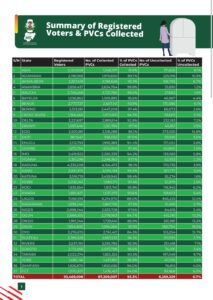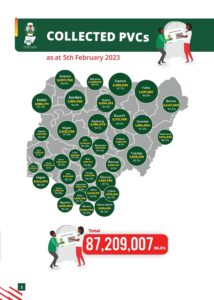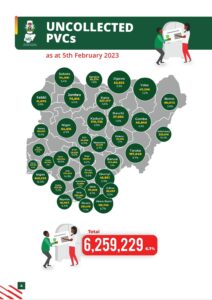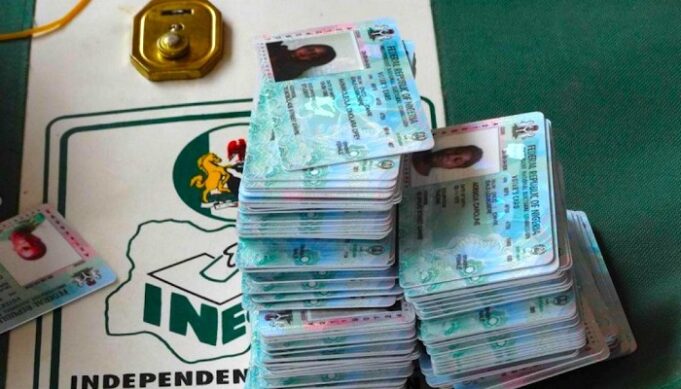The Independent National Electoral Commission (INEC) says 87,209,007 Permanent Voter Cards (PVCs), representing 93.3 per cent, have been collected ahead of the forthcoming general election.
INEC disclosed that 6,259,229 PVCs, representing 6.7 per cent, were uncollected.
The INEC Chairman, Prof. Mahmood Yakubu, disclosed this at the press briefing on the commission’s preparations for the 2023 general election in Abuja on Thursday.

Yakubu stated that the total number of registered voters was 93,469,008, adding that the 2023 general election will be held in 176,606 polling units (excluding the 240 polling units without registered voters) simultaneously.
He noted that the electoral umpire has painstakingly procured, organised, and delivered all the materials to the states for deployment, saying sensitive materials have been delivered to the states and were presently being delivered to the commission’s Local Government Area offices.
READ ALSO: Hunter uncovers scores of PVCs in Anambra forest
“Let me reiterate that the procedure for voting as provided in the Electoral Act 2022, clearly makes the use of the BVAS mandatory. So also, the use of the Permanent Voters Card (PVC). The No PVC, NO Voting rule subsists.
“In the last few months, we made 13,676,907 PVCs available for collection for new voters and applicants for transfer and replacement of lost/damaged cards. While we are pleased that the rate of collection is higher than in previous years, there are still, unfortunately, many cards that were not collected.


“Before the end of this briefing, we shall make public a summary of the numbers of collected and uncollected PVCs in each state of the federation. The detailed breakdown by polling units will be uploaded to the Commission’s website latest tomorrow Friday 24th February,” the INEC boss said.
Yakubu stated that INEC has completed all the testing of its technologies to be deployed for the 2023 general election, particularly the Bimodal Voter Accreditation System (BVAS) and the INEC Results Viewing Portal (IReV).
He further expressed satisfaction at the performance of the BVAS, saying the lesson learned from the mock accreditation held on February 4, 2023, has helped INEC in the training of 10,600 Registration Area Technical Support Staff (RATECHS).
“They will provide the necessary support to ensure that the deployment of the BVAS is without hitches,” Yakubu stressed.
The INEC chairman, who noted that vote-buying remains a major threat to Nigeria’s democracy, said the electoral umpire has worked closely with enforcement agencies to ensure that the menace is eliminated from the country’s electoral process.
“We are convinced that our joint operations before and on election day will vastly reduce the prospect of voter inducement, which is not only illegal but immoral.
“The ban on the use of mobile phones and photographic devices at the voting cubicles, is still in place. Some voters have used these devices in previous elections to snap their marked ballot papers for vote transaction.
“However, citizens are permitted to come to the polling units with these devices, as long as they do not take them to the voting cubicles. Our arrangement of placing the ballot box near the voting cubicle and away from party agents remains. Our staff have been trained in the administration of the polling units and their attention should be drawn to any deviation from that training,” he added.
Yakubu said INEC was adequately prepared for the 2023 general election, stressing that the commission remained fully committed to a free, fair, and credible process.
“I want to once again declare that our allegiance is only to Nigerians. Our commitment is to ensure that in this election we put everything in place for free choice, fair contest, and credible outcome,” the INEC boss said.
- Sheffield United relegated from Premier League - April 27, 2024
- EFCC chairman appoints chief of staff, 14 directors - April 27, 2024
- Liverpool’s Premier League title hopes dash over West Ham draw - April 27, 2024










